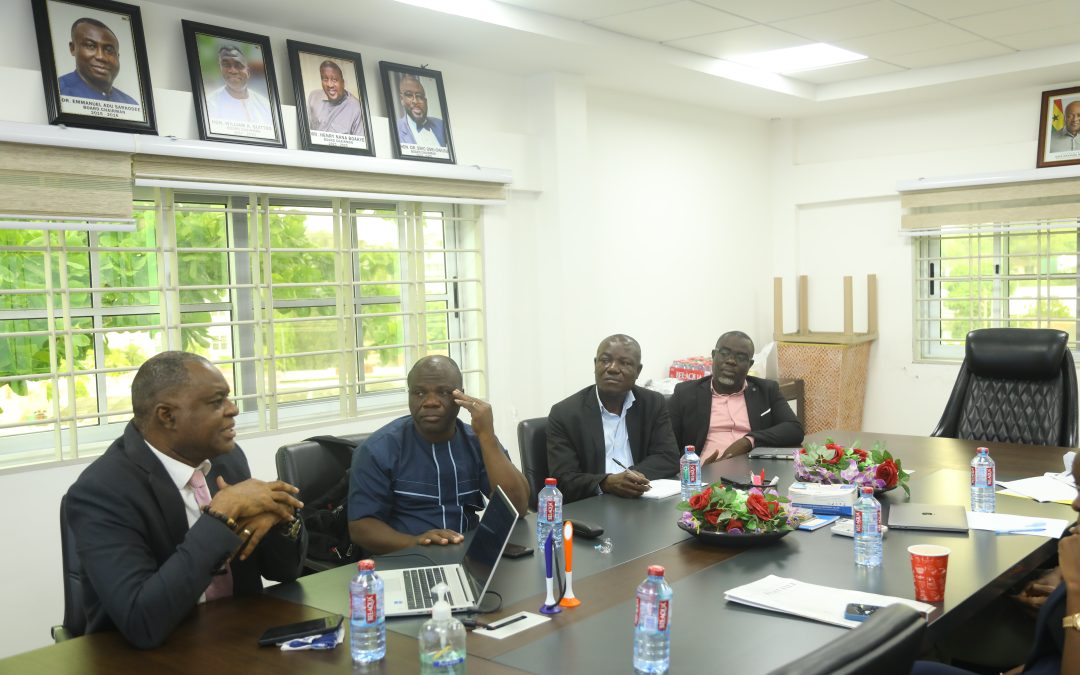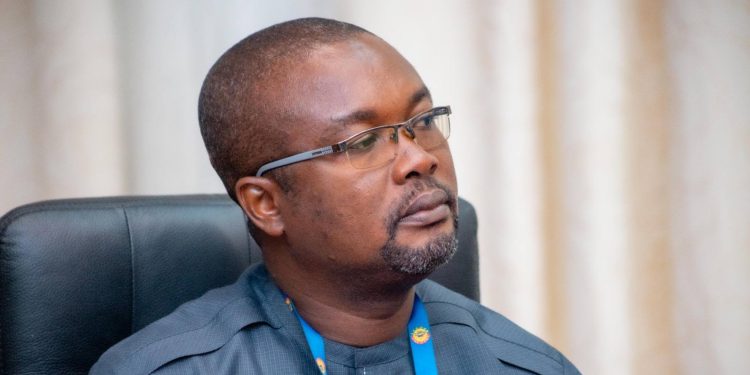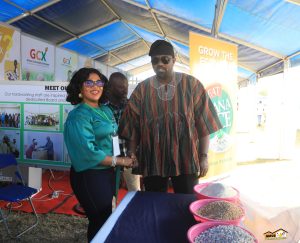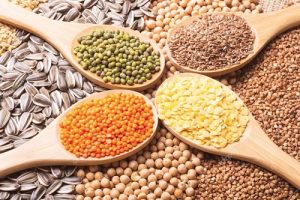
Nov 28, 2025
Mr Eric Opoku, the Minister of Food and Agriculture (MoFA) has urged the teeming unemployed youth to engage in farming, as the government does more to modernise agriculture.
He said the agriculture sector and farming in particular remained a lucrative enterprise with huge prospects to improve the socio-economic livelihoods of the people.
Mr Opoku dispelled the wrong public perception that farming was not lucrative and reserved for the poor, saying, “many of the successful individuals in the country are engaged in farming”.
“In fact, the biggest farmer in the country now is President John Dramani Mahama and no farmer in Ghana cultivates more onions, maize and rice than he does,” Mr Opoku stated.
The Minister gave the advice when he spoke at the dedication of Apostle Clement Brakatu Temple of the Apostles’ Continuation Church International in Sunyani on the theme, “Except the Lord build house”.
Mr Opoku said: “Many prominent individuals are reaping substantial benefits from agriculture”, urging the youth to engage in farming to better their lots.
He expressed worry that presently the country spent at least $400 million annually on tomato imports from Burkina Faso, saying, “If we stop importing tomatoes, that money can be redirected to building of factories and creation of more job opportunities for the youth”.
Mr Opoku said the government had introduced the Feed Ghana Programme to advance the growth of the agricultural sector making the agriculture sector more attractive as well as inspire the masses to do backyard gardening and contribute to household food security.
He said: “Senior High Schools are being encouraged to engage in farming to feed their students with institutions being encouraged to venture into large-scale farming under the feed programme”.
Mr Opoku said the profitability in farming moved him to actively engage in the enterprise, adding that, “many politicians, former and present ministers of state as well as Members of Parliament are now farmers”.
He regretted what he described as the under-utilisation of the nation’s fertile and arable lands, saying, “Despite our abundant arable lands, we have not cultivated it sufficiently and as a result, we import tomatoes and onions from Burkina Faso and Niger”.
Mr Seid Mubarak, the MP for the Sunyani East Constituency, noted that the construction and dedication of the temple was a testament to the commitment of religious bodies to preach the gospel and thereby shape society.
Source: GNA
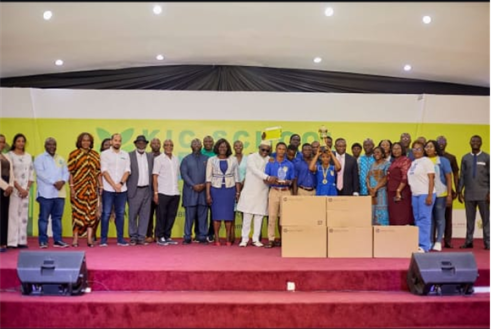
Nov 28, 2025
The Kosmos Innovation Center (KIC) celebrated a major milestone in its School Farm Programme, with participation rising to more than 700 schools across all 16 regions, reflecting growing national interest in practical agriculture and youth entrepreneurship.
Speaking at the 2025 KIC School Farm Awards Ceremony held Friday, November 22, at the Kwame Nkrumah University of Science and Technology (KNUST) Great Hall, Executive Secretary Benjamin Gyan-Kesse said the initiative is transforming how young people perceive agriculture by making it accessible, relevant and financially rewarding.
The programme, which began as an experiment to make farming appealing for students, has evolved into a nationwide model for hands on learning. It equips young people with practical agricultural skills alongside entrepreneurial competencies such as record keeping, marketing strategies and basic business planning.
Gyan-Kesse noted that students across Ghana are learning through direct experience, developing new perspectives and discovering pride in agricultural work. KIC supports all participating schools with inputs including seeds, fertilizers and tools, while providing technical guidance through consultants and trained teachers.
The strong uptake from over 450 schools last year to more than 700 this year demonstrates a significant mindset shift among young Ghanaians, according to the executive secretary. He emphasized that more than 700 participating schools represent a wave of young people gaining confidence, problem solving abilities and leadership skills through agricultural practice.
Gyan-Kesse expressed gratitude to programme partners, the Mastercard Foundation and the Blue Skies Foundation, calling on additional private sector players, development agencies and district assemblies to expand the initiative, particularly in areas such as irrigation systems and agricultural technology support for schools.
Nana Joe Mensah, Board Chair of KIC, praised the programme as one of the country’s most transformative youth initiatives, rooted in collaboration between government, development partners and the private sector. Each school farm represents a model of practical education where science, teamwork and innovation converge, he added.
Mensah expressed the board’s commitment to strengthening partnerships and scaling the programme to ensure every school in the country can use agriculture as a tool for experiential learning. The expansion would deepen agricultural education’s integration into Ghana’s educational system.
Deputy Director of the Ghana Education Service (GES), Dr. Munawaru Issahaque, speaking on behalf of Director-General Prof. Ernest Kofi Davis, stressed that agricultural education remains a strategic priority for the service. It addresses youth unemployment, supports rural transformation and enhances national food systems.
The GES plans to deepen partnerships with KIC, the Mastercard Foundation and the Blue Skies Foundation to expand the programme’s reach to more districts and schools. Dr. Issahaque announced intentions to integrate more farm based learning into the national curriculum, strengthen school farm infrastructure, particularly water systems, and expand agribusiness oriented extracurricular activities.
The deputy director acknowledged the crucial role of teachers and school coordinators, describing them as architects of educational change. Their innovation and dedication empower students and strengthen entire communities through agricultural education, he noted.
Addressing students, Dr. Issahaque said their creativity, perseverance and determination make them the heartbeat of the programme and future innovators capable of shaping Ghana’s agricultural landscape. The school farm competition could empower students to go beyond planting crops to cultivate critical thinking, resourcefulness, teamwork, and skills to turn ideas into tangible results.
The 2025 awards ceremony operated under the theme “Rethinking Agriculture: Growing Young Minds to Feed Ghana’s Future.” The theme reflects efforts to reframe farming from a perceived burden to a vibrant, profitable, and technologically viable career path for young Ghanaians.
Over 1,000 schools, including institutions serving students with special needs, applied to participate in the 2025 competition, according to programme data. This overwhelming interest indicates the positive impact the initiative has generated among educational institutions nationwide.
Judging criteria evaluated multiple dimensions beyond simple agricultural output. Assessors examined the quality and yield of farm produce, consistency of best agricultural practices, innovation in farming techniques, and the strength of business plans developed by student participants.
KIC officers visited participating school farms throughout the year to award marks based on vegetable quality and effectiveness of farming practices. Additionally, students faced evaluation on how the programme contributed to promoting agriculture among young people in their schools and communities.
Winners for the 2025 KIC School Farm Awards received desktop computers, certificates of participation, plaques, trophies and medals. The recognition aims to celebrate excellence while encouraging continued engagement with agricultural education and entrepreneurship.
The overall best Senior High School award went to St. John’s Grammar School located in Accra. Students from Holy Cross Seminary in the Oti Region won the first runner up position. Nyinahin Catholic Senior High School and St. Joseph’s Senior High Technical School claimed second and third runner up positions respectively.
For the basic school category, Gbulahagu District Assembly Junior High School in the Northern Region emerged as overall winners. Okanta District Assembly Basic School came in as first runner up, with Asawinso Methodist B and Anyinam District Assembly Girls’ Model School claiming second and third runner up positions respectively.
The 2024 edition saw Tamale Girls Senior High School and Okanta Presbyterian Basic School win overall best SHS and JHS awards respectively. These past winners stand as examples of the programme’s success in cultivating agricultural interest and entrepreneurial thinking among Ghanaian students.
The programme provides specialized training on practical agricultural concepts. Students learn about nursing seedlings, transplanting techniques, cultivation bed preparation, proper application and use of approved chemicals and fertilizers, and the use of personal protective equipment in farming operations.
The School Farm Competition forms an integral part of KIC’s strategy to promote practical agricultural education and enhance entrepreneurial potential among students across Ghana. The initiative addresses the broader organizational goal of raising a generation of agricultural entrepreneurs who understand agriculture’s importance in sustaining livelihoods and contributing to national development.
KIC, a youth leadership and entrepreneurship training center, focuses on increasing awareness of agricultural opportunities and associated entrepreneurial benefits for young people. The organization’s projects provide support to youth ranging from high school students to medium scale business owners.
The Blue Skies Foundation initially launched the school farm initiative, with KIC assuming full management and operational responsibility as of 2024. This transition enabled KIC to scale the programme significantly while maintaining quality standards and expanding geographic reach across all regions.
The Mastercard Foundation’s partnership with KIC provides crucial financial and technical support enabling the programme’s expansion. The foundation’s involvement reflects broader commitments to youth development, skills training and economic opportunity creation across Africa.
The programme aligns with growing recognition that agriculture offers viable career pathways for young Ghanaians. Despite agriculture employing significant portions of the population, particularly in northern regions where the sector engages approximately 66.7 percent of people according to the 2021 Ghana Living Standards Survey, youth participation remains limited.
Factors contributing to low youth engagement include reliance on rudimentary tools and farming methods, low adaptation to climate change, minimal innovation uptake, and persistent negative perceptions about farming as a career. The KIC School Farm Competition directly addresses these challenges by demonstrating modern, technology enabled agricultural practices.
The programme emphasizes Science, Technology, Engineering and Mathematics (STEM) education through experiential learning. Students apply theoretical agricultural knowledge in practical settings, improving their skills while developing understanding of how scientific principles operate in real world farming contexts.
Programme objectives include changing negative perceptions about agriculture that have developed in Ghana over recent decades, spreading farming culture among young people, encouraging students to consider careers along the agribusiness value chain, developing positive attitudes about food systems, the environment and entrepreneurship, and encouraging educational system reforms to include compulsory agricultural courses in first and second cycle schools.
The expansion to more than 700 schools represents progress toward these objectives. However, organizers acknowledge that achieving system level transformation requires sustained effort, increased resources, and continued partnership between government, private sector, civil society and educational institutions.
Agricultural education advocates argue that practical farming programmes offer multiple benefits beyond individual student development. They contribute to food security, rural economic development, youth employment generation, and environmental sustainability when implemented effectively.
The 2025 awards ceremony reinforced commitments from stakeholders to continue expanding and improving the School Farm Programme. The gathering brought together representatives from education, agriculture, government, development partners and the private sector to celebrate achievements while planning future programme enhancements.
Source: NewsGhana.com
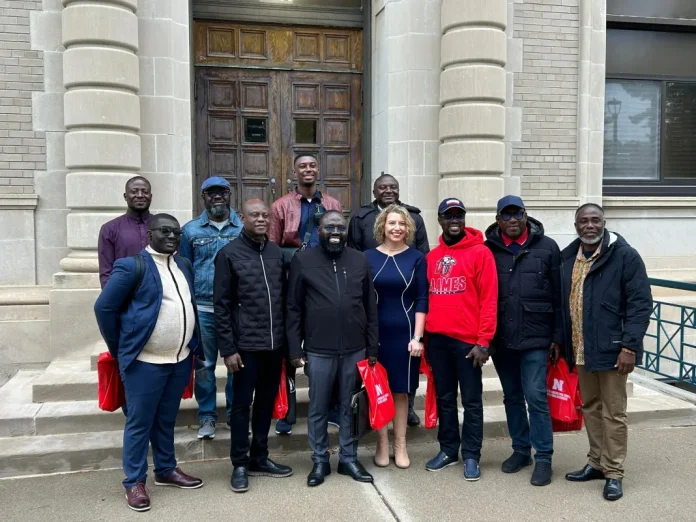
Nov 19, 2025
Ghana and Nebraska have launched a new agricultural partnership through the Ghana–Nebraska AgriWater Summit, creating opportunities in irrigation technology, academic exchange and agribusiness development between the West African nation and the American Midwest state.
The summit, held under the theme “Cultivating Solutions Across Continents,” brought together Ghanaian government officials, Nebraska state leaders, academic institutions and industry representatives to address shared challenges in climate-smart agriculture and sustainable water management.
Alberta Nana Akyaa Akosa, Co-Founder of the Ghana-Nebraska Agribusiness Growth and Trade Relations Chamber (GNEBCham) and Executive Director of Agrihouse Foundation, explained that the partnership targets irrigation development, farming modernisation and food system resilience. She noted that both regions face comparable agricultural challenges, making their collaboration strategically valuable.
“Through platforms like this, we are cultivating real partnerships that bring technology, expertise and investment together to drive sustainable agricultural growth,” she said.
A 15-member Ghanaian delegation, including Deputy Minister of Food and Agriculture John Dumelo and Dr. Peter Boamah Otokunor, Director of Presidential Initiatives in Agriculture, participated in an extensive study tour at the University of Nebraska-Lincoln (UNL) and its Daugherty Water for Food Global Institute.
The Daugherty Water for Food Global Institute works to address the global challenge of achieving food security with less stress on water resources through water management in agricultural and food systems. The delegation examined Nebraska’s water management systems, agritech models, livestock operations and mechanised farming technologies.
Dumelo described the experience as transformative, stating that Nebraska’s agricultural ecosystem offers lessons Ghana can apply, from irrigation technologies to livestock management. “This partnership can reshape our agricultural systems back home,” he added.
The summit established foundations for long-term academic collaboration between Ghanaian universities and UNL, with frameworks being developed for joint research programmes, faculty and student exchanges, curriculum development and collaborative innovation initiatives.
Dr. Otokunor emphasised that modern agriculture requires strong knowledge systems. “We cannot modernise agriculture without innovation. This partnership strengthens our academic and research foundations,” he said.
The delegation also met with Nebraska state officials, agribusiness firms and cooperatives including Beck’s Hybrid Seeds, PetSource by Tyson Foods, and Farmers’ Cooperatives to explore commercial partnerships.
Nebraska Senator Ken Schilz described the collaboration as a pathway to shared prosperity. “Ghana brings innovation and energy; Nebraska brings infrastructure and experience. Together we are building a bridge for global food security,” he said.
Several memorandums of understanding and partnership agreements between Ghanaian and Nebraskan institutions are being finalised. GNEBCham indicated these agreements will translate knowledge exchange into measurable impact, boosting productivity, supporting agricultural entrepreneurs and promoting sustainable agricultural growth.
Cecil Sunkwa-Mills, Vice President of GNEBCham, said the summit marks the beginning of a long-term movement. “This is more than a summit, it is a platform to strengthen trade relations, bridge agribusiness ecosystems and empower the next generation of agricultural innovators.”
Source: GhanaNews

Nov 17, 2025
The Deputy Minister for Food and Agriculture , John Dumelo , speaking on GTV’s breakfast show on November 14, 2025 outlined how the government is leveraging technology, mechanization, and value-chain initiatives to make farming more profitable and sustainable. “Efficiency drives productivity. It drives profitability. With these interventions, we’re not just planting crops, we’re building the future of Ghana’s agriculture,” he said.
A key pillar of this transformation is the Feed Ghana program, which aims to equip both institutional and smallholder farmers with the tools and knowledge they need to succeed.
He added that , this year alone, 50 farm service centers are set to be established nationwide, providing access to tractors, combine harvesters, irrigation systems, improved seeds, and expert agricultural guidance. These centers will decentralize support, giving farmers in even the most remote areas the resources to maximize productivity.
The government is also tackling post-harvest losses through the establishment of processing facilities for key crops. A newly commissioned tomato processing factory in Agogo converts excess harvests into paste and ketchup, with similar initiatives underway for onions. These efforts aim to reduce post-harvest losses from as high as 40% to below 15% in coming years.
Technology is playing a central role in this revolution. AI-driven devices such as FarmSense allow farmers to analyze soil composition and apply fertilizers with precision, while modern tractors and irrigation systems are equipped with AI to optimize water and nutrient use. Tailor-made solutions ensure each region’s unique soil and climate conditions are accounted for, improving crop yields and efficiency across the board.
Other sectors are not left behind. Investments in poultry, fisheries, and oil palm plantations are creating jobs and reducing import dependence, while establishing complete value chains for local production. The oil palm initiative alone is projected to generate over 250,000 jobs while producing locally refined edible oils.
The Minister emphasized that Ghana’s agricultural transformation is not only about increasing output, it’s about creating a resilient, modern, and profitable sector that can attract youth participation, reduce reliance on imports, and build export capacity.
With technology, mechanization, and value-chain innovation at the heart of these reforms, Ghana is positioning itself to become a model for agricultural efficiency and sustainability in Ghana.
Source: CitiNewsRoom



